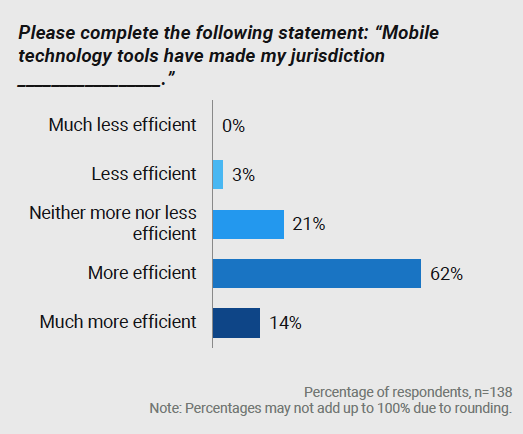Research Indicates Strong Support for Mobile Tech, Yet Slow Uptake Across Services

State and local government agree, mobile technology contributes directly to organizational efficiency. However, many agencies are still in the early stages of adoption and are working to understand the full spectrum of options.
To find out more about the mobile technology adoption progress of these agencies, Accela partnered with the Government Business Council (GBC) to poll a random sample of 139 government decision makers in September 2018.
Here are a few of our key findings that were released at the 2018 ICMA Annual Conference.
1. More than 75% of state and local leaders see a boost to efficiency

-
-
- 76% of state and local government employees report that their organizations have become more or much more efficient as a result of mobile technology
- Of these, a significant portion (18%) believe their organization has become much more efficient.
-
Analysis: These positive results confirm that mobile tech has a place in state and local government, but what can explain the difference in experiences? Read on to learn about the adoption journey and how implementation timelines affect perceptions.
2. State and local agencies have yet to complete the mobile journey across department services

- Nearly half (48%) of stateand local governmentagencies have taken concrete action to implement mobile technology, but have yet to finalize the implementation throughout the organization.
- By contrast, nearly one-fourth (23%)of respondent sindicate that their agencies have taken no action to implement mobile technology tools, of which more than half have not gotten past the planning stages.
Analysis: While some agencies have taken mobile technology adoption in full stride, others are using a more methodical approach. Across the nation, state and local jurisdictions represent a broad range of mobile tech implementation completion.
3. State and local government are implementing varied mobile technologies

- At least one-third of those surveyed indicated full implementation of mobile technology in internal/back office operations and management (38%), public safety tools (38%) , and permitting/licensing/inspection solutions (41%).
- Similarly, more than one-fourth of respondents report that their organization utilizes mobile technology in analytics/processing for customer service (26%), repair and maintenance requests(29%), and general citizen feedback submission (30%).
Analysis: While governments are focused on mobile solutions in such categories as permitting and licensing, public safety, and operations, the mobile adoption and investment by service varies greatly in other categories.
Insights from Accela
Today’s citizens increasingly demand convenient, electronic access to historically time-consuming government functions. Fortunately, much of what improves the customer experience for citizens (greater access to Web-based tools, user-friendly interfaces, and streamlined functionality) is also beneficial for state and local government agencies.
Through integrated, cloud-functional mobile technology, agencies across all jurisdictional levels can achieve quantifiable improvements in organizational efficiency and transparency, and can realize an overall boost to its citizen experience. By working with experienced technology partners, government can move closer to spending less on costly transformation efforts and focusing more on their missions.
Key areas to drive value through mobile
Permitting and Regulation
Licensing and permitting has always been a need for governments, now it is even more important in the evolving regulatory landscape. The legalization of cannabis and the sharing economy growth has caused regulatory challenges for many governments. Yet mobile-equipped application submissions are helpful in enhancing compliance.
Smart Communities
Mobile technology also creates opportunities for functional bridges with citizens and departments in cities, counties, and other jurisdictions – setting the stage for growth in smart communities.
Public Health
A variety of data collected through mobile devices can be used to feed big data and analytics efforts in public health, fighting opioid abuse and other pernicious dilemmas.
Open Data
Sharing and collaboration help contribute to economies of scale, allowing state and local government to leverage mutual experience similar to the data sharing models of the federal government.
Learn more about Accela’s solution for mobile permitting here or our solution for mobile city service requests here.






